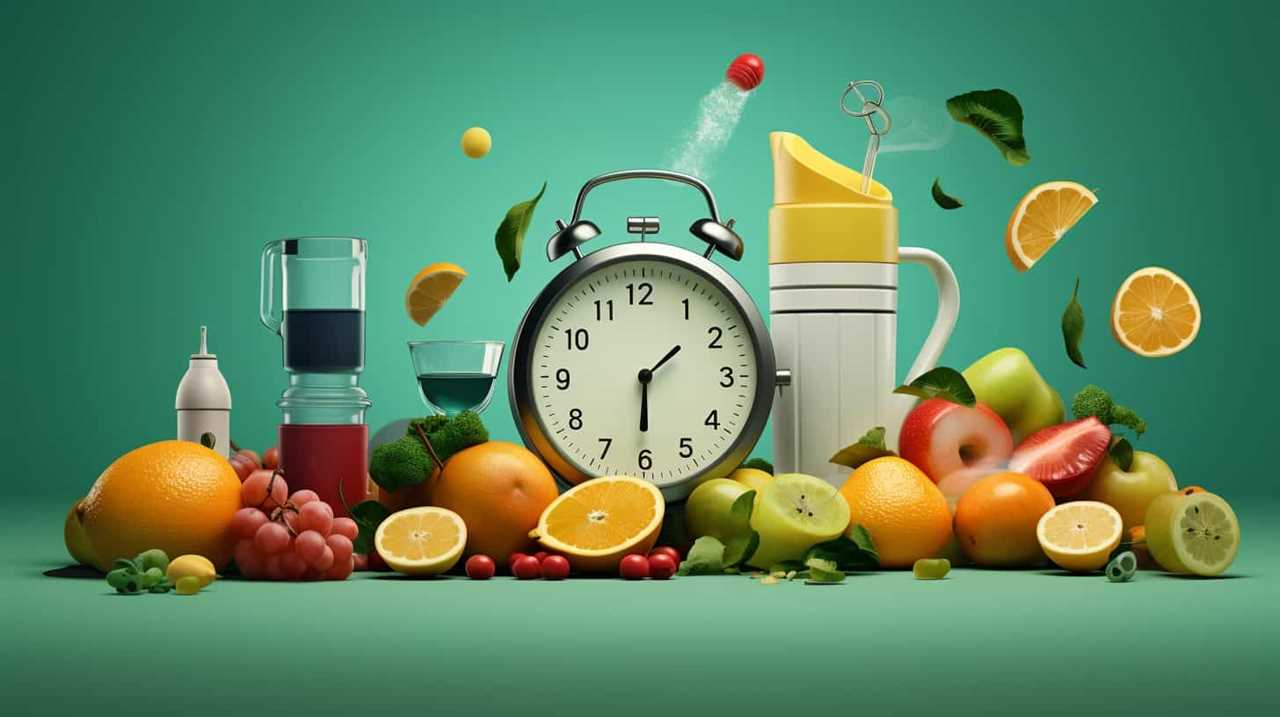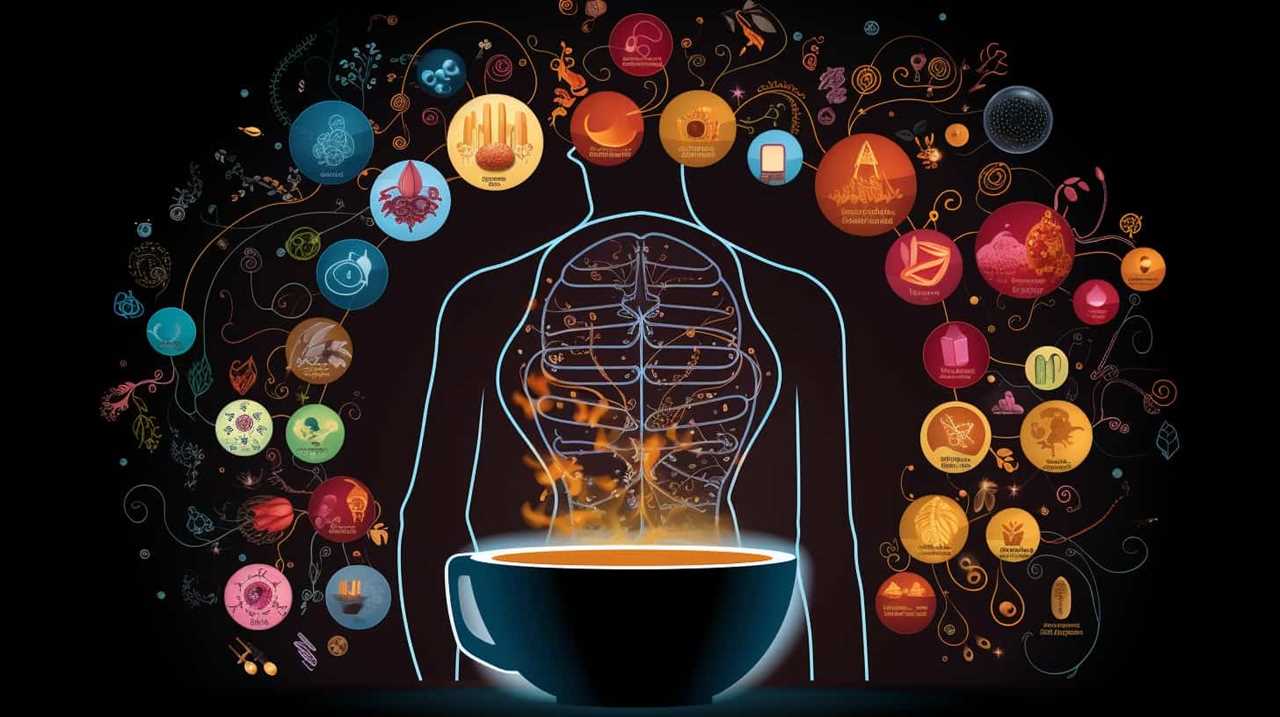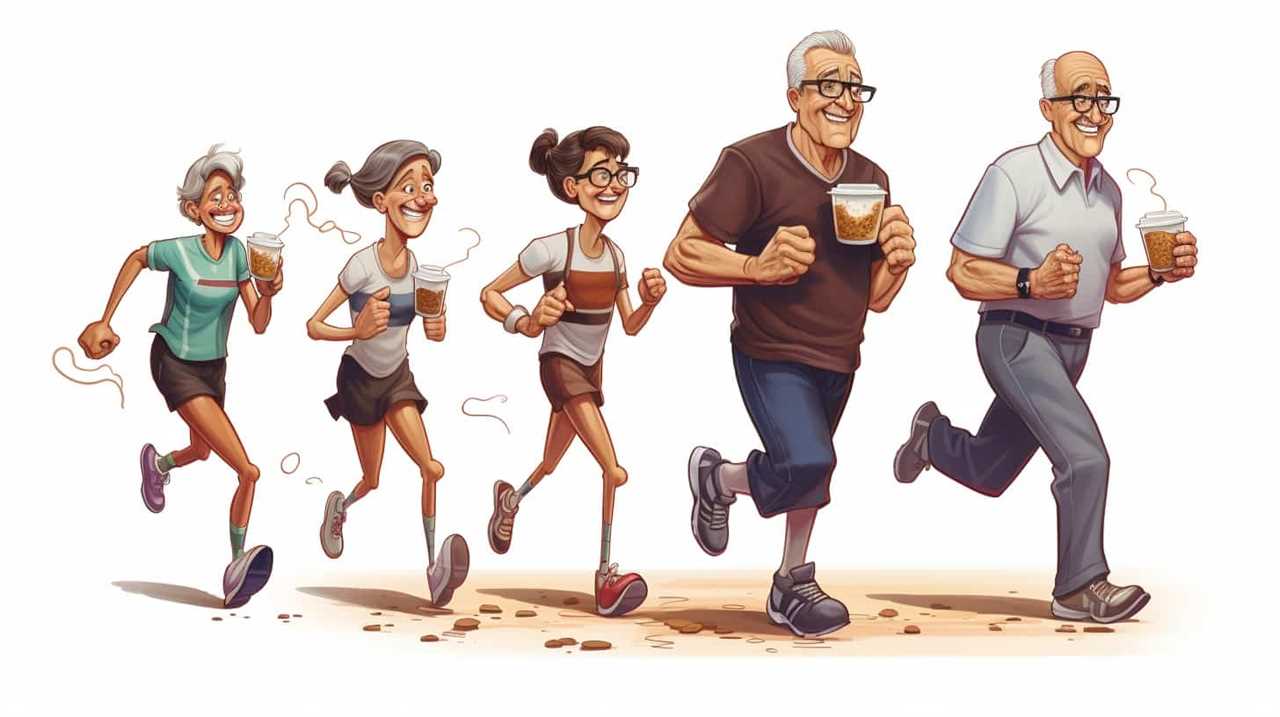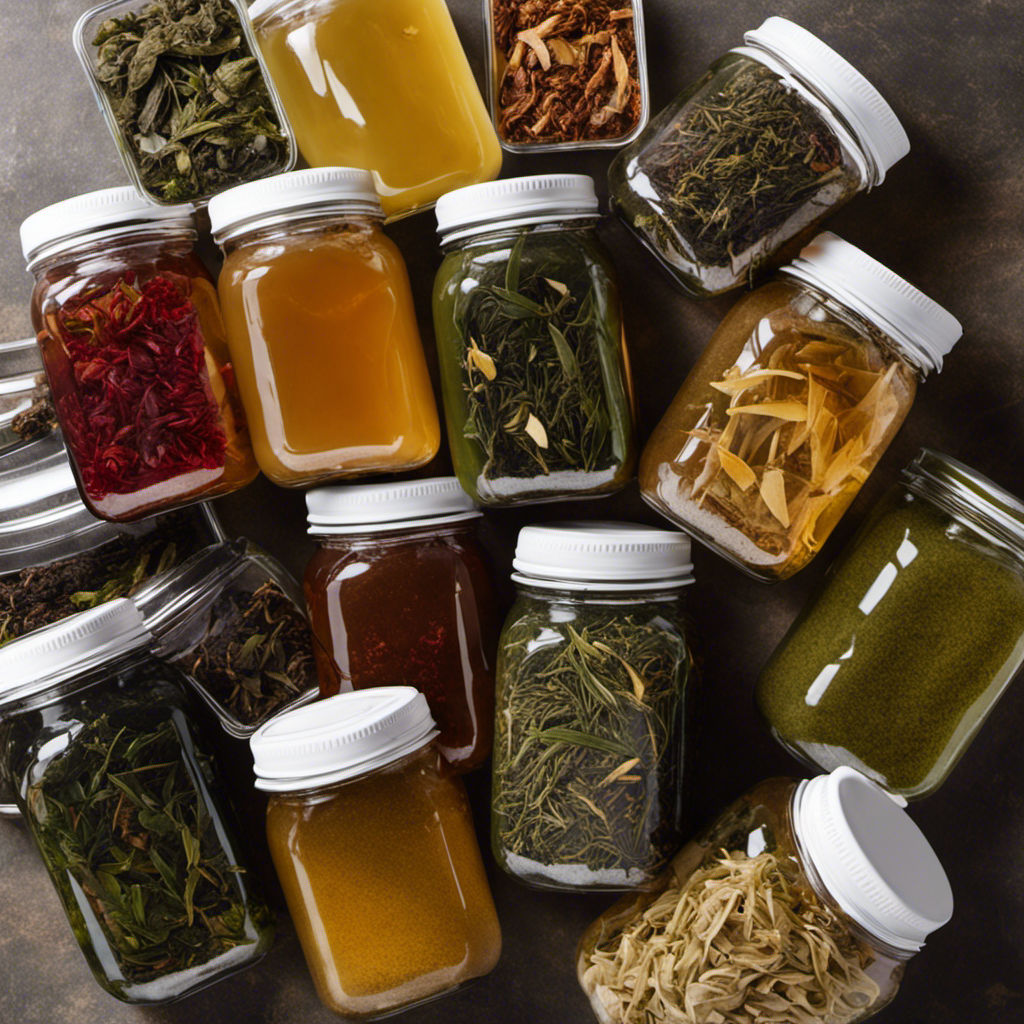Coffee, Tea and Alternatives and Health plus Fitness
Coffee Kick-In: Factors, Alternatives, And Health Benefits

As a coffee lover, I know firsthand the feeling of eagerly awaiting the kick-in of my morning cup of joe. It’s the jolt of energy that jumpstarts my day and keeps me going. But have you ever wondered what factors affect how long it takes for coffee to kick in? From the type of coffee to the brewing method, there are several variables at play that can impact the onset of its effects.
In this article, we’ll take a deep dive into the science behind coffee’s kick-in time. We’ll explore the factors that affect how quickly caffeine enters our bloodstream and how long it stays there. But for those who want a steady buzz without the jitters, we’ll also look at alternatives to coffee that can provide a sustained energy boost.
And, of course, we can’t forget about the many health benefits of drinking coffee. So let’s grab a cup of our favorite brew and dive in!
Key Takeaways
- The kick-in time of coffee can be affected by various factors such as coffee type, brewing method, body weight, and tolerance level.
- Green tea or decaf can be a good alternative for those who want a steady buzz without the jitters from coffee.
- Moderate coffee consumption of 3-4 cups per day can bring many health benefits, including lower risk of cardiovascular diseases, DMT2, and some cancers.
- Too much caffeine intake can cause negative side effects such as insomnia, jitteriness, and increased heart rate, so it’s important to be aware of your caffeine tolerance and stick to moderate consumption levels.
Kick-In Time
I’ve learned that the kick-in time for coffee can vary depending on factors such as coffee type, brewing method, body weight, and tolerance level. Drinking on an empty stomach can accelerate the effects, which may take up to 45 minutes and last for 6 hours.
It’s important to understand the factors affecting coffee’s kick-in time to optimize its effects. Contrary to popular belief, drinking coffee first thing in the morning may not be the best time to get the most out of it. Cortisol levels are naturally higher in the morning, which can counteract the effects of caffeine. Waiting an hour after waking up to have coffee can help maximize its effectiveness.
Myths and misconceptions about coffee kick-in time abound. Some believe that darker roasts have more caffeine than lighter ones, but the opposite is true. Lighter roasts have more caffeine as the roasting process breaks down caffeine molecules.
Another common myth is that espresso shots have more caffeine than a regular cup of coffee. While espresso shots are more concentrated, a standard serving size is smaller than a regular cup of coffee, so the caffeine content can be similar.
Understanding these myths and misconceptions can help individuals tailor their coffee consumption to their needs.
Alternatives
Green tea or decaf are good options for those who prefer a milder buzz without the jitters. Green tea has a wide range of health benefits, including reducing the risk of heart disease, improving brain function, and aiding in weight loss. It contains less caffeine than coffee, with an average of 35mg per cup, making it a good choice for those who are sensitive to caffeine or want to avoid its negative side effects.
Decaf coffee is another alternative for those who want to reduce their caffeine intake but still enjoy the taste of coffee. Decaf coffee goes through a process to remove most of the caffeine, leaving only a small amount, usually around 2-5mg per cup.
Decaf coffee has been found to have similar health benefits to regular coffee, including reducing the risk of type 2 diabetes and liver disease. However, it’s important to note that decaf coffee may not be completely caffeine-free and some people may still experience negative side effects.
Health Benefits
Studies have shown that regular consumption of coffee can bring many health benefits. One of the most significant findings is that coffee can reduce the risk of developing type 2 diabetes. In fact, a study published in the Journal of the American Medical Association (JAMA) found that those who drink coffee regularly have a 30% lower risk of developing type 2 diabetes than those who don’t drink coffee at all.
Additionally, coffee consumption has been linked to a reduced risk of cardiovascular diseases and some cancers. However, it’s important to note that while coffee can bring many benefits, it’s not without its risks. Consuming too much caffeine can lead to negative side effects such as jitteriness, anxiety, and insomnia.
It’s also important to be aware of your caffeine tolerance and to stick to moderate consumption levels. Overall, studies and findings suggest that coffee can be a valuable addition to a healthy lifestyle when consumed in moderation.
Origin
It’s interesting to note that the origin of coffee is disputed between Ethiopia and Yemen. Both countries claim to be the true origin of coffee, and while there is evidence supporting both claims, it is difficult to determine which one is true.
What is clear, however, is that coffee has had a significant impact on the economies of both countries. Ethiopia’s claim to the origin of coffee is based on a popular legend that tells the story of Kaldi, a goat herder who discovered the effects of coffee when his goats became more energetic after eating the berries from a certain tree. Ethiopia is still one of the largest coffee producers in the world and coffee is an important part of its economy.
Yemen’s claim to the origin of coffee is based on historical evidence that suggests coffee was first cultivated in the region during the 15th century. Yemen was once a major coffee exporter and played an important role in the global coffee trade. Today, however, Yemen struggles with political instability and its coffee industry has suffered as a result.
Frequently Asked Questions
How does coffee affect the body’s metabolism?
Have you ever wondered how coffee affects your body’s metabolism? Well, let me tell you.
Coffee has a direct impact on our metabolism, specifically on our ability to absorb caffeine. When we consume coffee, the caffeine is quickly absorbed into our bloodstream and travels to our brain, where it blocks adenosine receptors and stimulates the central nervous system. This process results in an increase in metabolic rate and can cause a feeling of increased energy and alertness.
However, the effects on metabolism vary depending on several factors, including coffee type, brewing method, body weight, and tolerance level. It’s important to note that excessive coffee consumption can lead to negative side effects such as jitteriness, anxiety, and insomnia. So, it’s essential to be aware of your caffeine tolerance and stick to moderate consumption levels to reap the benefits without the negative consequences.
To put it simply, coffee’s effect on metabolism is like a racecar speeding up after a pit stop, revving up our body’s engine and giving us a boost of energy.
What are some common additives to coffee that can affect its effectiveness?
When it comes to coffee additives that affect effectiveness, flavored syrups and milk alternatives are the most common culprits. Flavored syrups can add an extra dose of sugar and calories to your drink, which can cause a crash later on.
Milk alternatives, such as almond or soy milk, can also alter the taste profile of your coffee and affect its effectiveness.
Additionally, the brewing method can play a role in how additives affect the coffee’s kick-in time. For example, espresso shots may be less affected by added syrups or milk alternatives compared to drip coffee.
It’s important to experiment with different brewing methods and additives to find what works best for you and your body.
Can drinking coffee on a regular basis lead to addiction?
Yes, drinking coffee on a regular basis can lead to coffee dependence and withdrawal symptoms. Coffee contains caffeine, which is a psychoactive substance that can lead to addiction when consumed in large amounts or over a prolonged period.
Studies have shown that individuals who regularly consume coffee may experience withdrawal symptoms such as headaches, fatigue, irritability, and difficulty concentrating when they try to quit or reduce their intake. The severity and duration of these symptoms can vary depending on factors such as the amount of coffee consumed, the frequency of consumption, and individual tolerance levels.
Therefore, it’s important to be aware of your caffeine consumption and to gradually reduce your intake to avoid coffee dependence and withdrawal symptoms.
What are some potential negative health effects of consuming too much caffeine?
Consuming too much caffeine can have negative effects on one’s health. These effects include the development of caffeine tolerance and withdrawal symptoms. Caffeine tolerance occurs when the body becomes accustomed to the effects of caffeine and requires greater amounts to achieve the same level of stimulation. This can lead to increased consumption and potentially harmful side effects such as jitteriness, anxiety, and insomnia.
Abruptly reducing or discontinuing caffeine intake can result in withdrawal symptoms such as headaches, fatigue, and irritability. Therefore, it is important to be aware of one’s caffeine intake and tolerance level to avoid these negative effects.
How has the consumption of coffee evolved over time, and what cultural significance does it hold in different parts of the world?
It’s fascinating to see how coffee culture has evolved over time and its global impact. Coffee has become an integral part of people’s daily routines, from the morning cup of joe to the afternoon pick-me-up.
Its origins can be traced back to Ethiopia in the fifteenth century, and it has since spread worldwide, with each country developing its unique coffee culture.
In Italy, coffee is more of a social activity, with people gathering at cafes to chat and enjoy espresso shots. In the United States, coffee is more of a grab-and-go beverage, with a multitude of coffee shops on every corner.
Coffee has even become a symbol of resistance in some countries, such as Brazil, where it was used as a tool to protest against the government.
The global impact of coffee is undeniable, with over 2.25 billion cups consumed daily worldwide. It’s fascinating to see how a simple beverage has become so ingrained in different cultures and has taken on different meanings and significance.
Conclusion
In conclusion, understanding the factors that affect coffee’s kick-in time can help us make informed decisions about when and how much to consume. We have seen that the brewing method, type of coffee, body weight, and tolerance level all play a role in how quickly caffeine is absorbed and how long its effects last.
However, for those who want a steady buzz without the jitters, there are alternatives such as tea, yerba mate, and even chocolate that can provide a more gentle energy boost.
Beyond the immediate effects, drinking coffee has been linked to numerous health benefits, from reducing the risk of cardiovascular diseases to lowering the risk of certain cancers. It is important to note that moderation is key, and excessive caffeine intake can have negative consequences.
So, the next time you reach for that cup of joe, ask yourself: am I consuming it for the energy boost or the potential health benefits? By making conscious choices about our caffeine intake, we can reap the rewards of this beloved beverage while minimizing any potential risks.
Arf, an author and an innovative enthusiast of coffee, coffee alternatives, and tea, plays a crucial role as a contributor to the esteemed Cappuccino Oracle platform. Renowned for his curiosity and passion for these captivating beverages, Arf has carved out a unique space for himself in the world of exploration and writing. He realized that coffee, coffee alternatives, and tea are not mere drinks to keep one awake, but universes of flavors and stories waiting to be explored.
Arf’s articles for Cappuccino Oracle blend meticulous research with personal experiences, providing readers with an in-depth understanding of various types of coffee, coffee alternatives, and tea, along with their unique characteristics, cultures, and histories. His honest reviews and engaging narratives guide readers on their own journeys, helping them discover their preferences and find their perfect brew.
Coffee, Tea and Alternatives and Health plus Fitness
Mastering the Art of Boosting Metabolism Through Coffee

Being a coffee enthusiast, I have often pondered about the potential benefits of my favorite morning pick-me-up. It turns out, coffee can do so much more than just help me wake up!
In this article, I’ll share with you the secrets to mastering the art of boosting metabolism through coffee. We’ll explore the importance of fresh, high-quality beans, grinding your own for maximum effectiveness, and why avoiding processed coffee is crucial.
Get ready to discover how to enhance your coffee experience for optimal metabolism-boosting results.
Key Takeaways
- Fresh, high-quality beans retain flavor and aroma when stored properly
- Grinding your own beans allows for consistent grind size and optimal flavors
- Freshly brewed coffee made from whole beans is essential for boosting metabolism
- Sweetener-free coffee allows appreciation of natural flavors and aromas
The Importance of Fresh, High-Quality Beans
I absolutely believe that the key to a truly satisfying cup of coffee lies in using fresh, high-quality beans. When it comes to bean storage techniques, it’s important to keep them in an airtight container away from light, moisture, and heat. This helps preserve their flavor and aroma for a longer period of time.

As for the impact of roasting on coffee metabolism boosting, studies have shown that darker roasts have a higher caffeine content and can potentially increase metabolism. However, it’s worth noting that the difference isn’t significant enough to solely rely on coffee for weight loss. Regular exercise and a balanced diet are still essential.
Now, let’s move on to the next section where we’ll discuss grinding your own beans for maximum effectiveness in boosting metabolism.
Grinding Your Own Beans for Maximum Effectiveness
Grinding my own beans allows me to control the coarseness, resulting in a more flavorful and effective cup of coffee. When it comes to grinding techniques, finding the right roast is crucial.
Here’s how grinding your own beans can enhance your coffee experience:

-
Consistency: By grinding your own beans, you can achieve a consistent grind size, which is essential for extracting the optimal flavors from the coffee grounds.
-
Freshness: Pre-ground coffee can quickly lose its freshness and aroma. Grinding your beans just before brewing ensures that you’re getting the freshest cup possible.
-
Customization: Different brewing methods require different grind sizes. By grinding your beans at home, you can adjust the coarseness to match your preferred brewing method, whether it’s a French press, pour-over, or espresso.
Avoiding Processed Coffee for Optimal Metabolism Boosting
Drinking freshly brewed coffee made from whole beans is essential for achieving optimal metabolism boosting.

When it comes to choosing the right coffee beans, it’s important to consider whether to go for organic or conventional options. Organic coffee is grown without the use of synthetic pesticides and fertilizers, making it a healthier choice for both our bodies and the environment. Conventional coffee, on the other hand, may contain residues of these chemicals, which can have negative effects on our metabolism.
Additionally, the impact of caffeine on metabolism shouldn’t be overlooked. Caffeine has been shown to increase metabolic rate and fat oxidation, aiding in weight management. However, it’s important to consume coffee in moderation and be mindful of any potential negative effects, such as sleep disruption or increased heart rate.
Sweetener-Free: Why Drinking Coffee Without Additives Is Key
Using sweetener-free coffee allows me to fully appreciate the natural flavors and aromas of the beans. Not only does it enhance my coffee-drinking experience, but it also has several health benefits. Here are three reasons why drinking coffee without additives is key:
-
Preserves the true taste: Adding sweeteners masks the natural flavors of coffee. By going sweetener-free, you can savor the rich, complex taste of the beans and truly enjoy the nuances of different coffee varieties.

-
Reduces calorie intake: Sweeteners can add unnecessary calories to your daily diet. By skipping the additives, you can enjoy your coffee guilt-free and maintain a healthier lifestyle.
-
Avoids potential health risks: Some sweetener alternatives may have adverse effects on our health. By opting for sweetener-free coffee, you can minimize the potential risks associated with artificial additives.
Balancing Coffee Consumption for Sustainable Results
I find that moderation is key when it comes to achieving sustainable results with my coffee consumption. Understanding my caffeine tolerance and timing my coffee intake appropriately are crucial factors in maintaining a healthy relationship with this beloved beverage.
Caffeine tolerance varies from person to person. It’s important to listen to our bodies and be mindful of our individual limits. Consuming excessive amounts of caffeine can lead to negative side effects such as jitteriness, increased heart rate, and disrupted sleep patterns. It’s recommended to limit daily caffeine intake to 400 milligrams, which is roughly equivalent to four cups of brewed coffee.

The timing of coffee consumption also plays a significant role in maximizing its benefits. Consuming coffee in the morning can help jumpstart metabolism and enhance cognitive function throughout the day. However, it’s advised to avoid drinking coffee too close to bedtime, as it may interfere with sleep quality.
Frequently Asked Questions
Can I Achieve the Same Metabolism-Boosting Benefits With Instant Coffee?
Can I achieve the same metabolism-boosting benefits with instant coffee?
Instant coffee alternatives mightn’t have the same impact on metabolism as freshly brewed coffee. The brewing method plays a significant role in unlocking the metabolism-boosting properties of coffee.
Instant coffee is usually made through a different process that can affect its chemical composition. While instant coffee may still provide a caffeine boost, it may not have the same impact on metabolism as freshly brewed coffee.

How Does the Freshness of Coffee Beans Affect Its Metabolism-Boosting Properties?
When it comes to boosting metabolism, the freshness of coffee beans can make a real difference. Roasting the beans affects their metabolism-boosting properties, so the type of coffee bean you choose matters.
Freshly roasted beans contain higher levels of compounds like chlorogenic acid, which can increase metabolic rate. So, if you’re looking to master the art of boosting metabolism through coffee, opt for freshly roasted beans to maximize the effects and get that extra kickstart to your day.
Is It Necessary to Grind Coffee Beans Right Before Brewing to Maximize the Metabolism-Boosting Effects?
To maximize the metabolism-boosting effects of coffee, it’s necessary to grind the beans right before brewing. Grinding techniques play a crucial role in releasing the coffee’s flavors and active compounds, including those that boost metabolism.
What Additives or Sweeteners Should I Avoid Adding to My Coffee to Optimize Metabolism-Boosting Benefits?
To optimize the metabolism-boosting benefits of coffee, it’s best to avoid adding certain additives or sweeteners. Natural sweeteners like stevia or honey are great options. They provide sweetness without adding extra calories or negatively impacting metabolism.

As for coffee roast level, it doesn’t significantly impact its metabolism-boosting properties. So feel free to enjoy your preferred roast level while reaping the benefits of a boosted metabolism.
Is There a Recommended Amount of Coffee Consumption per Day to Maintain Sustainable Metabolism-Boosting Results?
There isn’t a specific recommended daily intake of coffee to maintain sustainable metabolism-boosting results.
However, research suggests that moderate caffeine consumption can have positive effects on metabolism.
It’s important to listen to your body and not exceed your personal tolerance for caffeine.

Drinking too much coffee can lead to negative side effects like anxiety or disrupted sleep.
It’s best to enjoy coffee in moderation and find the right balance for your individual needs.
Conclusion
In conclusion, mastering the art of boosting metabolism through coffee requires fresh, high-quality beans, grinding your own beans, avoiding processed coffee, and drinking it without additives.
Did you know that a study found that drinking three cups of coffee a day can increase metabolism by up to 11%? This statistic not only offers a practical and evidence-based approach to improving metabolism, but it also evokes excitement and motivation for coffee lovers seeking sustainable results.

So go ahead, enjoy your coffee and reap the benefits!
In the vast and diverse world of coffee, coffee alternatives, and tea, Olivia has found her calling. As an author and a dedicated coffee and tea aficionado, her work for Cappuccino Oracle reflects her profound love and understanding of the intricate complexities found within these beverages. Olivia’s passion for the subject serves as both a catalyst for her creativity and a connection point with her audience.
Olivia’s appreciation for coffee, coffee alternatives, and tea blossomed at an early age. She discovered that these beverages invigorated her senses and stimulated her creative spirit. From the nuanced flavors of single-origin roasts to the captivating narratives intertwined with coffee, coffee alternatives, and tea trade and culture, Olivia found an unlimited source of inspiration in her daily cup.
Her love for these beverages and her talent for storytelling eventually converged at Cappuccino Oracle. As an author, Olivia’s mission is to illuminate the intricate tapestry that makes up the world of coffee, coffee alternatives, and tea. Her articles span a diverse range of topics, encompassing everything from the unique flavors of different brews to the sociocultural history intertwined with their cultivation and consumption.
Coffee, Tea and Alternatives and Health plus Fitness
Mastering the Fine Art of a Metabolism-Boosting Coffee Routine

I have always enjoyed beginning my day with a cup of coffee, but recently I found a method to enhance it further – by incorporating it into a metabolism-boosting routine.
By following a few simple steps, I’ve been able to not only enjoy my morning coffee, but also support my body’s natural fat-burning capabilities.
In this article, I’ll share the secrets to mastering the fine art of a metabolism-boosting coffee routine, so you can start your day off on the right foot too.
Key Takeaways
- Sticking to a two-cup-a-day coffee schedule keeps you energized and focused throughout the day.
- Opting for organic coffee is a more sustainable and environmentally-friendly choice.
- Limiting sugar and dairy intake has several health benefits.
- Including a healthy snack, like a piece of fruit, in your mid-morning routine boosts energy levels and curbs hunger.
Setting a Daily Coffee Intake Schedule
I’ve found that sticking to a two-cup-a-day coffee schedule keeps me energized and focused throughout the day. Creating a coffee ritual has become an integral part of my daily routine.

It’s not just about the caffeine kick, but also the process of making and enjoying my coffee that sets the tone for the day. Experimenting with different brewing methods has allowed me to discover my preferred flavors and strength.
Whether it’s a French press, pour-over, or espresso machine, each method brings a unique taste to my cup. I’ve learned that the key to a successful coffee routine is finding what works best for you.
Opting for Organic Coffee
Having researched the benefits of organic coffee, I’m now considering switching to a more sustainable and environmentally-friendly option. Organic coffee is grown without the use of synthetic fertilizers or pesticides, which reduces the impact on both the environment and our health.
Additionally, opting for fair trade coffee ensures that farmers receive fair wages and work in safe conditions. This supports the well-being of coffee-growing communities around the world.

Exploring different coffee brewing methods can also enhance the taste and quality of your organic coffee. From pour-over to French press, each method offers a unique flavor profile and allows you to customize your brewing experience.
Limiting Sugar and Dairy Intake
To improve my health, I’m cutting back on sugar and dairy in my daily diet. Reducing sweeteners and dairy products has been shown to have several health benefits.
High sugar intake is linked to an increased risk of obesity, type 2 diabetes, and heart disease. Similarly, excessive dairy consumption has been associated with digestive issues and inflammation in some individuals.
However, it can be challenging to find suitable alternatives to satisfy our sweet tooth or replace dairy products. Thankfully, there are many natural sweeteners like honey or maple syrup that can be used in moderation.

Additionally, exploring alternatives such as plant-based milks or yogurt made from coconut, almond, or soy can provide a creamy and nutritious dairy substitute.
Including a Healthy Snack
Adding a piece of fruit to my mid-morning routine is a great way to curb hunger and boost my energy levels. Choosing nutrient-rich snacks is essential for maintaining a healthy and balanced diet. Incorporating intermittent fasting into my routine has been a game-changer for me, and having a healthy snack during this period is crucial.
Fruits like apples, bananas, and oranges are excellent options as they’re packed with vitamins, minerals, and fiber. These nutrients help to keep me feeling full and satisfied, while also providing a natural source of energy. By opting for nutrient-rich snacks, I’m not only nourishing my body but also supporting my overall well-being.
Avoiding Coffee Near Meal Hours
I usually try to avoid drinking coffee near meal hours, but sometimes I can’t help but indulge in a cup of joe with my breakfast. Coffee has always been my go-to morning pick-me-up, but I recently discovered that timing my coffee consumption can have a significant impact on my energy levels throughout the day. This is especially important when practicing intermittent fasting, a popular eating pattern that has numerous health benefits. To help you make the most of your coffee routine, I’ve created a table that outlines the best times to enjoy your java for maximum energy:

| Time of Day | Coffee Benefits |
|---|---|
| Morning | Enhances wakefulness |
| Mid-morning | Boosts focus and productivity |
| Early afternoon | Combats post-lunch slump |
Maintaining Optimal Hydration
Although I enjoy my morning cup of coffee, it’s important to prioritize maintaining optimal hydration throughout the day. Water intake plays a crucial role in supporting our overall health and well-being, including our metabolism.
Here are four reasons why staying hydrated is essential for a healthy metabolism:
-
Hydration aids in digestion: Drinking enough water helps to break down food and facilitate the absorption of nutrients, which is vital for a properly functioning metabolism.
-
Water supports thermogenesis: Proper hydration promotes thermogenesis, the process by which our bodies generate heat and burn calories. Staying hydrated can help boost our metabolism and increase calorie burning.

-
Dehydration slows down metabolism: When we’re dehydrated, our bodies may enter a state of conservation, slowing down our metabolism to preserve energy. This can lead to weight gain and difficulty losing weight.
-
Water helps to eliminate waste: Adequate hydration is essential for proper kidney function, allowing for the efficient removal of waste products from our bodies. This helps to maintain a healthy metabolism.
To optimize your metabolism, make sure to drink enough water throughout the day. Aim for at least eight glasses of water daily, and remember to hydrate before, during, and after physical activity.
Stay hydrated and support your body’s natural metabolic processes!

Choosing Black Coffee
The key to boosting my metabolism lies in choosing black coffee, as it provides a low-calorie and energizing option.
Black coffee, without any added sugar or cream, is a great choice for those looking to rev up their metabolism. Not only does it contain virtually no calories, but it also contains caffeine, which has been shown to have several health benefits.
Caffeine can increase your metabolic rate, helping you burn more calories throughout the day. It can also enhance fat oxidation, which means your body will use more fat for fuel.
Additionally, studies have found that caffeine can improve exercise performance and increase alertness.

Frequently Asked Questions
Can I Drink Decaffeinated Coffee Instead of Regular Coffee to Boost My Metabolism?
I can drink decaffeinated coffee instead of regular coffee to boost my metabolism.
However, there are other metabolism-boosting drinks that can be considered as alternatives.
It’s important to note that while coffee can temporarily increase metabolism, the effect is minimal and varies from person to person.
To maximize the benefits, incorporating exercise and a balanced diet is crucial.

Additionally, other drinks like green tea, matcha, and ginger tea have been shown to have metabolism-boosting properties.
Is It Okay to Add Artificial Sweeteners and Non-Dairy Creamers to My Coffee for Flavor?
I’ve wondered if adding artificial sweeteners and non-dairy creamers to my coffee is okay for flavor. Well, it turns out there are pros and cons to consider.
Artificial sweeteners can provide sweetness without the added calories, but some studies suggest they may have negative effects on our health.
Non-dairy creamers can add creaminess, but they often contain additives and preservatives.

If you’re looking for alternatives, natural sweeteners like stevia or honey and non-dairy milk options can be great options to try.
How Does the Temperature of the Water Used to Brew Coffee Affect Its Metabolism-Boosting Properties?
How does the temperature of the water used to brew coffee affect its metabolism-boosting properties?
Well, the temperature of the water can have an impact on the extraction process of the coffee beans, which in turn affects the release of compounds that have potential metabolism-enhancing properties.
Some studies suggest that brewing coffee at higher temperatures can result in a higher extraction of these compounds, potentially leading to a greater metabolic effect.

However, it’s important to note that the impact of temperature on metabolism enhancement may vary depending on the coffee bean variety and brewing time.
Are There Any Specific Types of Healthy Snacks That Work Best With a Metabolism-Boosting Coffee Routine?
When it comes to a metabolism-boosting coffee routine, incorporating healthy snack options can be beneficial. The timing of snacks is also important.
Choosing snacks that are nutritious and low in calories can help keep your metabolism active throughout the day. Some examples of healthy snacks that work well with a metabolism-boosting coffee routine include fruits, vegetables, nuts, and Greek yogurt.
These snacks provide a good balance of nutrients and can help you feel satisfied between meals.

Can I Drink Herbal Tea or Other Caffeine-Free Beverages Instead of Coffee to Boost My Metabolism?
Sure, herbal tea can be a good alternative to coffee if you’re looking to boost your metabolism without caffeine.
Herbal teas like green tea, oolong tea, and peppermint tea have been found to have various health benefits, including potentially boosting metabolism.
However, it’s important to note that the effect may not be as powerful as that of coffee.
Conclusion
In conclusion, by mastering the fine art of a metabolism-boosting coffee routine, you can supercharge your mornings and fuel your day with incredible energy.

Set a schedule, choose organic coffee, ditch the sugar and dairy, and indulge in a healthy snack.
Remember to stay hydrated and avoid coffee near meal times. And for the ultimate metabolism kick, go for black coffee.
With these simple steps, you’ll be unstoppable and ready to conquer anything that comes your way!
In the vast and diverse world of coffee, coffee alternatives, and tea, Olivia has found her calling. As an author and a dedicated coffee and tea aficionado, her work for Cappuccino Oracle reflects her profound love and understanding of the intricate complexities found within these beverages. Olivia’s passion for the subject serves as both a catalyst for her creativity and a connection point with her audience.
Olivia’s appreciation for coffee, coffee alternatives, and tea blossomed at an early age. She discovered that these beverages invigorated her senses and stimulated her creative spirit. From the nuanced flavors of single-origin roasts to the captivating narratives intertwined with coffee, coffee alternatives, and tea trade and culture, Olivia found an unlimited source of inspiration in her daily cup.
Her love for these beverages and her talent for storytelling eventually converged at Cappuccino Oracle. As an author, Olivia’s mission is to illuminate the intricate tapestry that makes up the world of coffee, coffee alternatives, and tea. Her articles span a diverse range of topics, encompassing everything from the unique flavors of different brews to the sociocultural history intertwined with their cultivation and consumption.
Coffee, Tea and Alternatives and Health plus Fitness
Picking the Perfect Perk-Me-Up: Top 10 Times to Drink Coffee for a Metabolism Boost"

As someone who loves coffee, I am constantly on the lookout for the best moments to savor my favorite drink. If you share my enthusiasm, you’ll be thrilled to discover the top 10 times to have coffee for a metabolism boost.
From jumpstarting your morning to powering through workouts and overcoming afternoon slumps, this article will guide you on when to sip that delicious cup of joe to maximize your energy levels and rev up your metabolism.
Let’s dive in and discover the perfect perk-me-up!
Key Takeaways
- Drinking coffee in the morning provides an energy boost, revs up metabolism, and helps burn more calories at rest.
- Consuming coffee as a pre-workout power-up enhances endurance, focus, and overall performance, leading to increased calorie burn.
- Prioritizing proper nutrition, hydration, and rest contributes to maximizing workout performance and increasing endurance.
- Drinking coffee during mid-morning and afternoon hours improves alertness, cognitive function, and metabolism, helping to combat the afternoon slump and keep energy levels up.
First Thing in the Morning
I always have a cup of coffee first thing in the morning to kickstart my day. Not only does it help me wake up and feel more alert, but it also has some great benefits for my metabolism throughout the day.

The science behind morning coffee and its metabolism boost lies in its caffeine content. Caffeine stimulates the nervous system and increases the production of adrenaline, which can increase your metabolic rate. This means that your body burns more calories even at rest. Additionally, coffee has been shown to improve insulin sensitivity, which can help regulate blood sugar levels and prevent weight gain.
So, starting your day with a cup of coffee can’t only give you that much-needed energy boost, but also help rev up your metabolism for the day ahead.
Now, let’s move on to the next section and discover the benefits of coffee as a pre-workout power-up.
Pre-Workout Power-Up
Before hitting the gym, I always make sure to power up with a cup of coffee. The caffeine in coffee acts as a natural stimulant, giving me the energy boost I need to push through my workouts.

Not only does it help increase my endurance and focus, but studies have also shown that pre-workout caffeine intake can enhance overall performance and help burn more calories.
Coffee for Energy
The caffeine in a cup of coffee is a great way to boost energy levels before a workout. When it comes to pre-workout fuel, coffee has been shown to have numerous benefits. Not only does it provide an energy boost, but it can also improve focus and increase endurance. Studies have found that caffeine can enhance athletic performance by reducing perceived exertion and increasing fat oxidation.
Additionally, coffee has been shown to improve muscle recovery post-exercise. It’s important to note that individual tolerance to caffeine varies, so it’s best to experiment and find the right amount that works for you. Aim to consume your coffee about 30 minutes to an hour before your workout for optimal effects. Remember to hydrate properly and listen to your body during exercise.
Pre-Workout Caffeine Benefits
Drinking a moderate amount of caffeine before my workout provides significant benefits to my energy levels and performance. Research shows that consuming caffeine before exercise can enhance both physical and mental performance. Here are four reasons why pre-workout caffeine can be beneficial:

-
Increased alertness: Caffeine stimulates the central nervous system, helping me feel more alert and focused during my workout.
-
Enhanced endurance: Caffeine has been found to improve endurance by reducing perceived exertion, allowing me to push through a tough workout.
-
Improved fat burning: Caffeine has been shown to increase fat oxidation, making it an effective tool for those looking to lose weight or improve body composition.
-
Reduced muscle pain: Caffeine has pain-relieving properties that can help reduce muscle soreness and perceived pain during and after exercise.

When it comes to caffeine dosage, it’s recommended to consume around 3-6 mg per kilogram of body weight, about 30-60 minutes before exercise. It’s important to note that individual tolerance may vary, so it’s best to start with a lower dose and gradually increase if needed. As with any supplement, it’s always a good idea to consult with a healthcare professional before making any changes to your routine.
Maximizing Workout Performance
To maximize my workout performance, I focus on fueling my body with nutritious foods and prioritizing hydration.
It’s important to provide our bodies with the right nutrients to support energy levels and muscle function during exercise. Eating a balanced meal that includes carbohydrates, protein, and healthy fats before a workout can help maximize performance by providing sustained energy.
Hydration is also crucial for optimal performance and workout recovery. Drinking enough water before, during, and after exercise helps maintain proper fluid balance, supports muscle function, and prevents dehydration.

Additionally, getting enough rest and sleep is essential for maximizing performance. Rest allows our bodies to recover and repair, leading to improved muscle strength and endurance.
Mid-Morning Boost
I can’t start my day without a cup of coffee to power through my mid-morning slump. Coffee has long been known for its ability to provide a much-needed energy boost, especially during those mid-morning hours when focus and concentration may start to wane.
Here are four reasons why coffee is the perfect pick-me-up during this time:
- Increased alertness: The caffeine in coffee stimulates the central nervous system, leading to increased alertness and enhanced cognitive function.
- Improved concentration: Studies have shown that coffee can improve focus and concentration, making it easier to tackle tasks and stay productive.
- Metabolism boost: Coffee has been found to increase metabolic rate, helping to burn more calories throughout the day.
- Mood enhancer: Coffee can also have a positive impact on mood, promoting feelings of happiness and well-being.
Afternoon Slump Buster
My go-to afternoon slump buster is a strong cup of coffee, and it never fails to give me the energy boost I need to power through the rest of the day.

However, I understand that not everyone is a coffee lover, and some may be looking for alternative ways to stay focused during the afternoon. Luckily, there are a few options that can provide a similar pick-me-up without the caffeine.
One alternative to coffee is green tea, which contains a moderate amount of caffeine and also provides antioxidants that can support brain health. Another option is matcha, a powdered form of green tea that delivers a more concentrated dose of caffeine and antioxidants.
Additionally, herbal teas like peppermint or chamomile can help relax the mind and improve focus without any caffeine.
So, whether you choose coffee or one of these alternatives, finding a way to combat the afternoon slump is essential for maintaining productivity and focus.

Now, let’s move on to the next topic: the post-lunch pick-me-up.
Post-Lunch Pick-Me-Up
After lunch, I often find myself feeling sluggish and in need of a pick-me-up. That’s when a post-lunch coffee comes to the rescue.
Not only does it provide a burst of energy, but research shows that drinking coffee after lunch can also boost afternoon productivity.
Energy After Lunch
The caffeine in a cup of coffee can provide an amazing energy boost after lunch. It’s no secret that many of us find ourselves in need of a pick-me-up during those post-lunch hours.

When it comes to finding alternative ways to boost our energy levels, there are a few options worth considering:
-
Green tea: With its lower caffeine content and high levels of antioxidants, green tea provides a more moderate and sustained energy boost.
-
Exercise: Engaging in physical activity, such as a brisk walk or stretching, can naturally increase your energy levels and help combat that mid-afternoon slump.
-
Hydration: Sometimes, all we need is a glass of water to rehydrate and refresh our bodies, which can help combat fatigue.

-
Healthy snacks: Opting for nutrient-dense snacks like fruits, nuts, or yogurt can provide a natural energy boost without the crash.
Boosting Afternoon Productivity
I find that taking a short power nap after lunch really boosts my afternoon productivity. Not only does it combat fatigue, but it also gives me a burst of energy and helps me stay focused for the rest of the day.
However, I’ve also discovered another technique that works wonders for boosting creativity and productivity in the afternoon: drinking a cup of coffee. Studies have shown that caffeine can enhance cognitive function and improve alertness, making it the perfect pick-me-up when you’re feeling sluggish.
Just be mindful of the timing, as consuming caffeine too late in the day can interfere with your sleep. So, before a study session or any task that requires mental sharpness, a cup of coffee can provide that extra boost to help you perform at your best.

Before a Study Session
Before starting a study session, I like to fuel up with a cup of coffee. It helps me stay focused and alert, giving me the boost I need to absorb information effectively. However, I understand that not everyone is a fan of coffee or may want to explore alternatives.
Here are some study strategies and coffee alternatives that can provide a similar energizing effect:
-
Green tea: Rich in antioxidants and containing a moderate amount of caffeine, green tea can provide a gentle boost without the jitters.
-
Herbal tea: Opt for caffeine-free herbal teas such as chamomile or peppermint, which can help calm the mind and increase focus.

-
Matcha: This powdered form of green tea is known for its high caffeine content and can provide sustained energy throughout your study session.
-
Dark chocolate: A small piece of dark chocolate can provide a mild stimulant effect and improve cognitive function.
Pre-Work Meeting Energizer
To boost productivity and focus during pre-work meetings, I like to incorporate a quick energizer activity that engages everyone and promotes creativity. One effective activity is a short mindfulness exercise. This can be as simple as closing our eyes and taking a few deep breaths, or doing a body scan to relax any tension.
Research has shown that mindfulness practices can enhance pre-workout focus and mental clarity. By taking a moment to ground ourselves and bring our attention to the present moment, we can clear our minds of distractions and improve our cognitive abilities. This can lead to better concentration, problem-solving skills, and overall performance during meetings.

Late Afternoon Revival
One of my favorite ways to experience a late afternoon revival is by savoring a refreshing iced coffee. It not only provides a delightful pick-me-up, but also boosts my energy and helps me stay focused for the rest of the day. Here are a few reasons why coffee is the perfect choice for late afternoon energy:
-
Caffeine content: Coffee contains caffeine, a natural stimulant that can increase alertness and reduce fatigue. It helps to combat the afternoon slump and keeps you energized.
-
Mental clarity: The caffeine in coffee can enhance cognitive function and improve focus. It helps to sharpen your mind and improve productivity during the late afternoon hours.
-
Taste and enjoyment: Drinking a delicious iced coffee can be a pleasurable experience that uplifts your mood and rejuvenates your senses.

-
Versatility: Coffee can be customized to suit your preferences. Whether you like it black, with milk, or flavored, there are endless options to enjoy your late afternoon cup of joe.
Before an Evening Workout
I often like to fuel up with a cup of coffee before my evening workout to give me that extra boost of energy. But does caffeine really have an impact on exercise performance in the evening? Research suggests that it does.
A study published in the Journal of Applied Physiology found that consuming caffeine before an evening workout can enhance exercise performance. Caffeine acts as a stimulant, increasing alertness and reducing the perception of effort during exercise. It also stimulates the central nervous system, leading to improved muscle contraction and endurance.
However, it’s important to note that the effects of caffeine can vary from person to person, so it’s best to experiment and see what works for you. Remember to consume caffeine in moderation and stay hydrated to optimize your performance and overall well-being.

Nighttime Productivity Enhancer
I’ve always wondered if having coffee at night could actually enhance productivity without disrupting sleep. Is it possible to find a balance between the benefits of caffeine and the need for quality sleep? And if so, what’s the optimal nighttime caffeine dosage to maximize productivity without sacrificing rest?
Let’s explore the effects of coffee on sleep quality and discover if there’s a way to boost productivity during nighttime hours.
Coffee Vs. Sleep Quality
The article explores the effects of coffee on sleep quality and its potential as a nighttime productivity enhancer. Coffee is a popular beverage that many people rely on to stay awake and alert during the day. However, consuming coffee too close to bedtime can disrupt sleep patterns and lead to sleep deprivation. It’s important to understand the impact of coffee on our sleep quality in order to make informed decisions about when to consume it.
Here are a few key points to consider:

- Coffee contains caffeine, a stimulant that can interfere with our ability to fall asleep and stay asleep.
- Consuming coffee several hours before bedtime may still have an impact on sleep quality and patterns.
- Individuals vary in their sensitivity to caffeine, so it’s important to pay attention to personal reactions.
- Opting for decaffeinated coffee or other non-caffeinated alternatives in the evening can help promote better sleep.
Considering the potential effects of coffee on sleep quality, it raises the question: what’s the optimal nighttime caffeine dosage?
Optimal Nighttime Caffeine Dosage?
An article suggests that finding the right amount of caffeine to consume at night for optimal productivity is a topic of discussion.
Nighttime caffeine consumption can have significant effects on sleep quality, making it essential to strike a balance.
Caffeine is a stimulant that can interfere with the sleep-wake cycle, causing difficulty falling asleep and reducing the overall quality of sleep.

It’s recommended to avoid consuming caffeine at least six hours before bedtime to minimize its disruptive effects.
However, individual tolerance to caffeine varies, and some people may be more sensitive to its effects than others.
It’s important to listen to your body and pay attention to how caffeine affects your sleep.
Experimenting with different cutoff times and observing the resulting sleep patterns can help determine the optimal nighttime caffeine dosage for you.

Frequently Asked Questions
Can Drinking Coffee in the Evening Affect My Sleep Quality?
Drinking coffee in the evening can affect my sleep quality. The caffeine in coffee can interfere with falling asleep and staying asleep.
It’s best to avoid consuming coffee close to bedtime to ensure a good night’s sleep. If you’re sensitive to caffeine, it’s recommended to limit your coffee consumption in the afternoon and switch to decaffeinated options in the evening.
Prioritizing a good sleep routine is essential for overall well-being.
How Much Coffee Should I Consume Before a Workout to Maximize Its Benefits?
When it comes to maximizing my workout, I’ve found that timing is key.

Pre workout consumption of coffee can be a game changer. I’ve discovered that having a cup of joe about 30 minutes before hitting the gym gives me the boost I need to push through my exercises with intensity and focus.
It’s like having a turbocharger for my metabolism.
Can Drinking Coffee on an Empty Stomach in the Morning Lead to Digestive Issues?
Drinking coffee on an empty stomach in the morning can sometimes lead to digestive issues. It’s because the caffeine in coffee stimulates the production of stomach acid, which can cause discomfort and even heartburn for some individuals.
To avoid this, it’s recommended to have a small meal or snack before drinking coffee. Incorporating a balanced breakfast into your morning routine can help prevent any potential digestive problems and ensure a smooth start to your day.

Is It Necessary to Drink Coffee Before a Study Session, or Are There Other Alternatives?
When it comes to studying, many people rely on coffee for an energy boost. But is it necessary?
Coffee vs. green tea: which is better for studying? While coffee is known for its stimulating effects, green tea can also provide a gentle, sustained energy boost without the jitters.
Additionally, there are natural alternatives to coffee for an energy boost during study sessions, such as matcha tea or herbal teas like ginseng or peppermint.
It’s all about finding what works best for you.

Are There Any Potential Side Effects of Consuming Coffee Throughout the Day for an Extended Period of Time?
When it comes to consuming coffee throughout the day for an extended period of time, there are potential risks and long-term effects to consider.
It’s important to be aware that excessive coffee intake can lead to increased heart rate, anxiety, and disrupted sleep patterns.
Additionally, dependency on caffeine may develop, causing withdrawal symptoms when trying to cut back.
It’s always a good idea to moderate your coffee consumption and listen to your body’s needs.

Conclusion
So there you have it, the top 10 times to drink coffee for a metabolism boost.
From the moment you wake up to those late afternoon slumps, coffee can be your secret weapon for staying energized and productive throughout the day.
But remember, moderation is key. Too much caffeine can have negative effects on your health.
So enjoy your cup of joe strategically and reap the benefits of a well-timed perk-me-up.

Cheers!
In the vast and diverse world of coffee, coffee alternatives, and tea, Olivia has found her calling. As an author and a dedicated coffee and tea aficionado, her work for Cappuccino Oracle reflects her profound love and understanding of the intricate complexities found within these beverages. Olivia’s passion for the subject serves as both a catalyst for her creativity and a connection point with her audience.
Olivia’s appreciation for coffee, coffee alternatives, and tea blossomed at an early age. She discovered that these beverages invigorated her senses and stimulated her creative spirit. From the nuanced flavors of single-origin roasts to the captivating narratives intertwined with coffee, coffee alternatives, and tea trade and culture, Olivia found an unlimited source of inspiration in her daily cup.
Her love for these beverages and her talent for storytelling eventually converged at Cappuccino Oracle. As an author, Olivia’s mission is to illuminate the intricate tapestry that makes up the world of coffee, coffee alternatives, and tea. Her articles span a diverse range of topics, encompassing everything from the unique flavors of different brews to the sociocultural history intertwined with their cultivation and consumption.
-

 Americano4 weeks ago
Americano4 weeks agoHow Many Calories Are in a Americano
-

 Americano7 days ago
Americano7 days agoHow to Make Americano With Moka Pot
-

 Americano2 weeks ago
Americano2 weeks agoHow to Make an Americano in a French Press
-

 Americano1 week ago
Americano1 week agoHow to Make Iced Americano With Instant Coffee
-

 Americano2 weeks ago
Americano2 weeks agoWhat to Add to an Americano at Starbucks
-

 Americano2 weeks ago
Americano2 weeks agoHow to Make Americano With a Nespresso Machine
-

 Americano6 days ago
Americano6 days agoHow to Make Americano With Bialetti
-

 Americano1 week ago
Americano1 week agoHow to Make Dutch Bros Americano

















